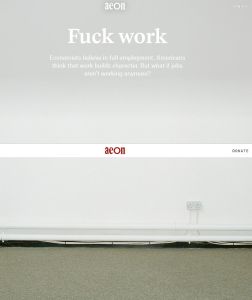
Fuck work
Economists believe in full employment. Americans think that work builds character. But what if jobs aren’t working anymore?
Recommendation
American politicians across the political spectrum agree at least on one thing: the need to restore “full employment.” Economic historian James Livingston posits that this is both unrealistic and uncalled-for. Writing for the online magazine Aeon, he argues that the obsession with work prevents Americans from facing the realities of the 21st-century labor market and from finding a new purpose in life that doesn’t revolve around their jobs. getAbstract recommends this stirring critique of American work culture as an upper for the unemployed and food for thought for workaholics. And by the way, Livingston’s writing style is more refined than his essay’s title might suggest.
Take-Aways
- Americans define themselves through work; it provides a daily structure, an income and a sense of self-worth.
- No net jobs have been created in the United States since 2000, and up to half of all jobs may disappear due to automation in the next two decades.
- Transfer payments from the federal government make up 20% of all household income in the United States, and half of all people with employment qualify for food stamps.
- The federal government can afford to pay every American a basic income. Yet doing so would run counter to Americans’ strong work ethic.
- With jobs rapidly disappearing, Americans will need to find new purpose in life beyond their work world.
Summary
Most Americans define themselves through work. It provides a daily structure, an income and a sense of self-worth. And it supposedly builds character. But Americans’ belief in this work ethic doesn’t match the realities of the 21st-century labor market. First, there isn’t enough work for everyone. No net jobs have been created in the United States since the year 2000. Additionally, per one estimate, up to half of all existing jobs may disappear due to automation by 2035. The notion that federal policies can restore full employment in the United States is unrealistic. Second, many jobs in the United States don’t pay enough to provide workers with a living wage. Half of all Americans with jobs qualify for food stamps, and “transfer payments” from the government make up 20% of all household income.
“What, exactly, is the point of earning a paycheck that isn’t a living wage, except to prove that you have a work ethic?”
Americans’ belief in hard work is based on the premise that input correlates with reward. But this balance is skewed: While many full-time employees are unable to make ends meet, others earn millions of dollars through illegal or unethical business practices – as exemplified by drug dealers and bankers involved in deception, fraud and money laundering.
“Securing ‘full employment’ has become a bipartisan goal at the very moment it has become both impossible and unnecessary.”
This situation may be dire, but it can also be an opportunity for reflection. What’s the purpose of a job that doesn’t provide for your basic needs? Without a job, what experience will form people’s daily routine and enhance character? “What would society and civilization be like if we didn’t have to ‘earn’ a living – if leisure was not our choice but our lot?”
“Taxing the profits of corporations to finance a welfare state that permits us to love our neighbors and to be our brothers’ keeper isn’t an economic problem. It’s something else – it’s an intellectual issue, a moral conundrum.”
Paid work no longer produces appropriate incomes. It also isn’t an economic necessity: The US government has the means to generate enough revenue to provide sustenance to every American. It can raise Social Security contributions above the current $127,200 ceiling and increase taxes on corporate income. Raising corporate taxes will have no negative effect on job creation: US corporations aren’t creating new jobs with the profits they make. Society can afford welfare payments; but the question is rather whether people will approve such payments in a culture that excessively values work.
About the Author
James Livingston is history professor at Rutgers University in New Jersey. His latest book is No More Work: Why Full Employment is a Bad Idea.
This document is intended for the use of University of Minnesota - (CEMBA) UMN Executive Leadership Insights employees.
My Highlights
Did you like this summary?
Read the articleThis summary has been shared with you by getAbstract.
We find, rate and summarize relevant knowledge to help people make better decisions in business and in their private lives.
Already a customer? Log in here.











Comment on this summary